16 Jun 2016 | Azerbaijan, Azerbaijan News, News and features
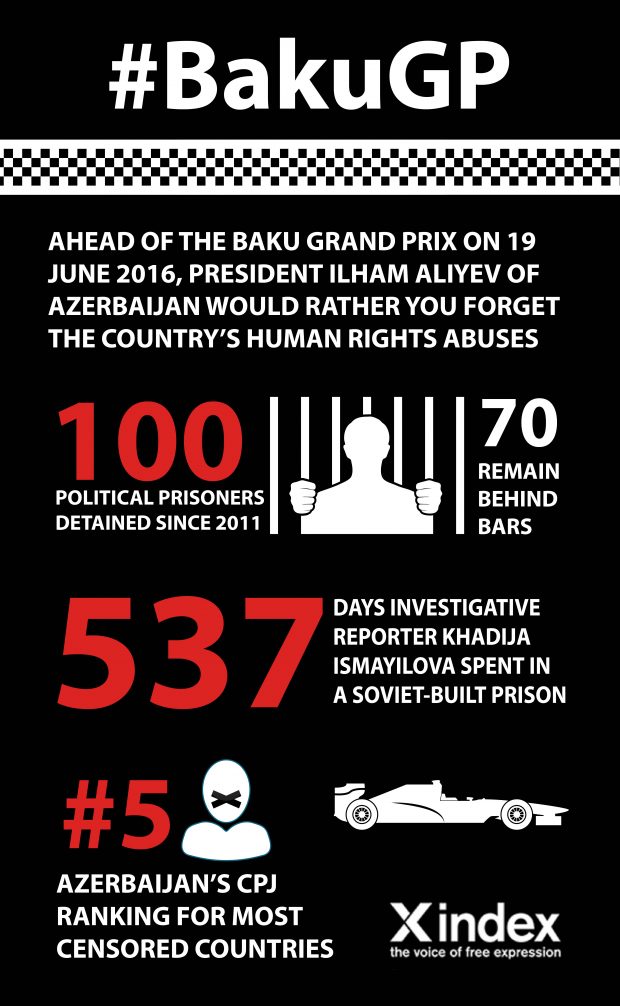
“Having seen the development work in Baku as it’s neared completion over the past few months, it’s clear that the organisers have put a lot of planning and resources into the infrastructure around the circuit, and it promises to be a very significant event in the region.” So said Fernando Alonso, Formula One double World Champion and “Baku Ambassador” ahead of the European Grand Prix on the streets of the city on 19 June.
In his ambassador role, Alonso observed the progress being made on the streets of the Azerbaijani capital during an 8-9 March visit. What he almost certainly didn’t observe was the dire human rights situation in the country that has seen an assault on fundamental freedoms and attempts to silence critical voices.
The reason he wouldn’t have seen such abuses is because the Azerbaijani government has gone to great lengths to make the country appear as law-abiding and democratic in an attempt look legitimate and draw foreign money.
Azerbaijan has previously hosted other significant sports and cultural events — including the inaugural European Olympic Games in 2015 and the Eurovision Song Contest in 2012 — but as son of the country’s sports minister, Aria Rahimov, said, the upcoming Grand Prix is an opportunity “to promote our city from different points: from the touristic point of view, investment”.
There are many things President Ilham Aliyev’s autocratic regime, which has been in power since 2003, would rather we didn’t promote. Here are just three.
His government has:
1) Imprisoned journalists, activists and opposition politicians.
Over 100 political prisoners have been detained since 2011, when during the Arab Spring the country’s rulers feared an uprising at home. Around 70 of these prisoners remain behind bars.
Azerbaijani investigative journalist Khadija Ismayilova may have been released from prison last month, but two trumped-up charges against her — illegal entrepreneurship and tax evasion –remain. Her seven-and-a-half-year jail sentence has only been reduced to a three-and-a-half-year suspended term and she isn’t free to leave the country.
Many others, including journalist Seymur Hezi, are still serving prison sentences on charges that were widely condemned for being politically motivated to silence outspoken critics of the government of President Aliyev.
2) Led a crackdown on independent media outlets.
The Committee to Protect journalists lists Azerbaijan as the fifth most censored country in the world, ahead of Iran, China and Cuba. The ranking is in part due to the lack of independent media as “offices have been raided, advertisers threatened, and retaliatory charges such as drug possession levied against journalists”.
Azerbaijan’s independent media is under attack more than ever before. Most recently, editors of the Index award-winning opposition newspaper Azadliq received a letter from the Azerbaijan publishing house with a warning of discontinuation of the newspaper if it does not pay off its debts before 27 June. Azadliq — widely recognised as one of the last remaining independent news outlets operating inside the country — is convinced that the authorities are deliberately trying to put it out if business.
3) Allowed a climate of violence against critics to fester.
Torture and ill-treatment are widespread against political prisoners. Youth activists Bayram Mammadov and Giyas Ibrahimov were tortured in May 2016, allegedly to draw confessions for trumped-up drugs charges.
Public attacks against journalists are widespread and murder is not uncommon. In 2005, Elmar Huseynov, an independent Azerbaijani journalist, widely known for his harsh criticism of Azerbaijani authorities and president Aliyev, was murdered in outside his home in Baku. In 2011, Rafiq Tağı, who had written an article deemed to be critical of Islam and the Islamic prophet Mohammed was stabbed in a car park near his home, later dying in Baku hospital.
27 May 2016 | About Index, Azerbaijan, Europe and Central Asia, mobile, News and features
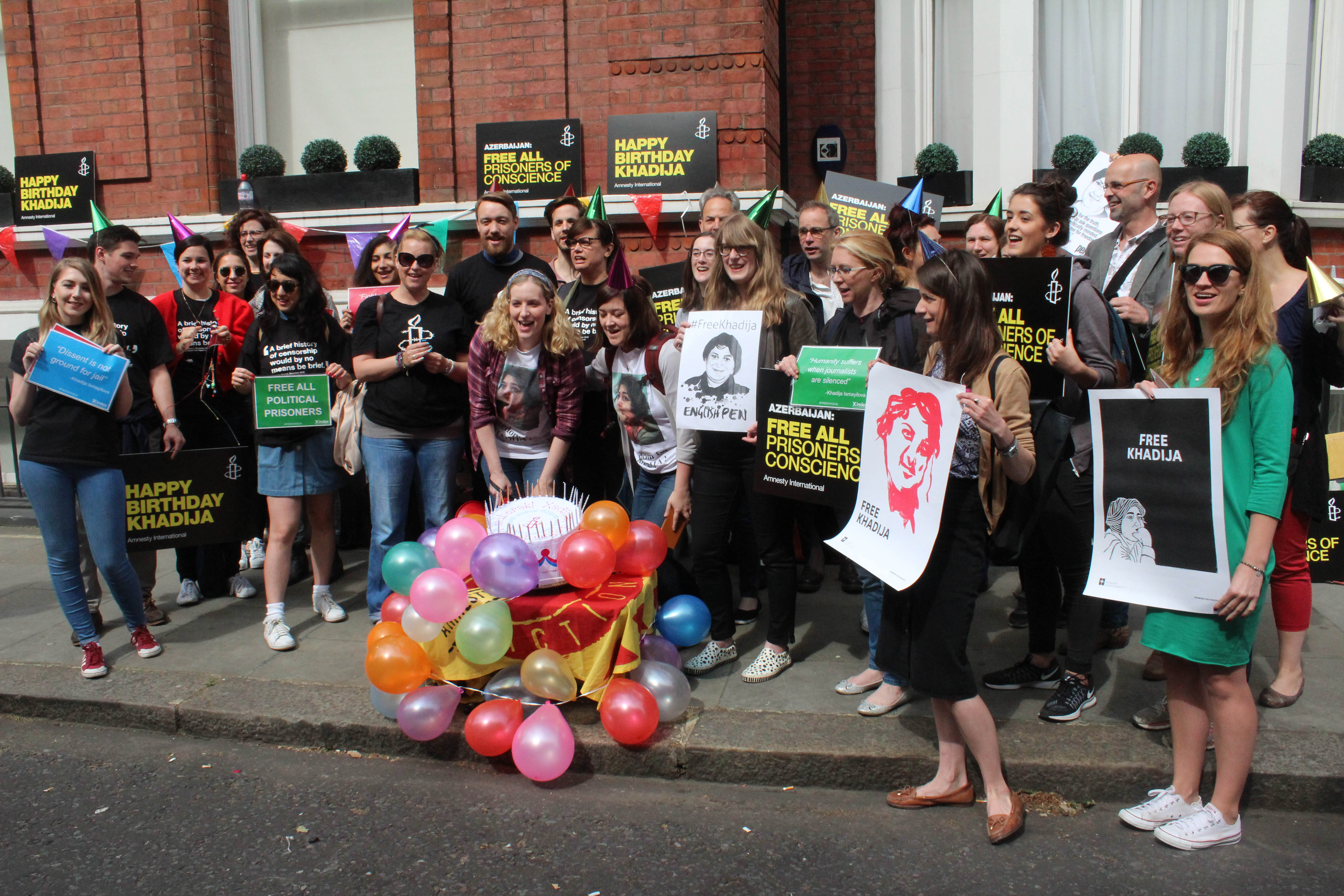
Protest for Khadija Ismayilova, Azerbaijan embassy, London. Credit: Cat Lucas, English Pen
Azerbaijani investigative journalist Khadija Ismayilova may have been released from prison on Wednesday, but two trumped-up charges against her — illegal entrepreneurship and tax evasion –remain. Her seven-and-a-half-year jail sentence has only been reduced to a three-and-a-half-year suspended term and she isn’t free to leave the country.
Today is Ismayilova’s 40th birthday and to mark the occasion, protesters gathered at 40 different demonstrations from around the world, not just to celebrate, but to call for all charges against her to be quashed. Index joined other members of the Sports for Rights coalition at the Azerbaijani embassy in London (see above).
“Let’s take a moment to celebrate the work that’s been done by this remarkable woman,” Rebecca Vincent, the co-ordinator of the Sport for Rights campaign, told demonstrators.
Currently, around 70 political prisoners — including journalists, bloggers, activists and religious followers — sit in Azerbaijani jails, and Vincent called on protesters to sustain their focus on all of them. “That’s what Khadija has asked for for her birthday,” she said.
Seymur Hezi is an Azerbaijani journalist serving a five-year prison sentence on charges of “aggravated hooliganism”. Hezi, who contributed to the Index on Censorship Freedom of Expression Award-winning newspaper Azadliq, was sentenced on 29 January 2015. He was arrested on 29 August 2014 following an altercation in which the journalist was defending himself from a physical assault and harassment, according to his lawyers. “His case doesn’t get enough international attention, possibly because he is not an English speaker and not well networked,” Vincent said.
Other political prisoners include Ilgar Mammadov, the opposition politician who leads Azerbaijan Republican Alternative Movement, who has been in jail for over three years, and Ilkin Rustemzade, the activistt originally jailed following his Harlem Shake video filmed in Baku.
On the same day Ismayilova was released, two more political prisoners, a youth activist and a journalist, were arrested.
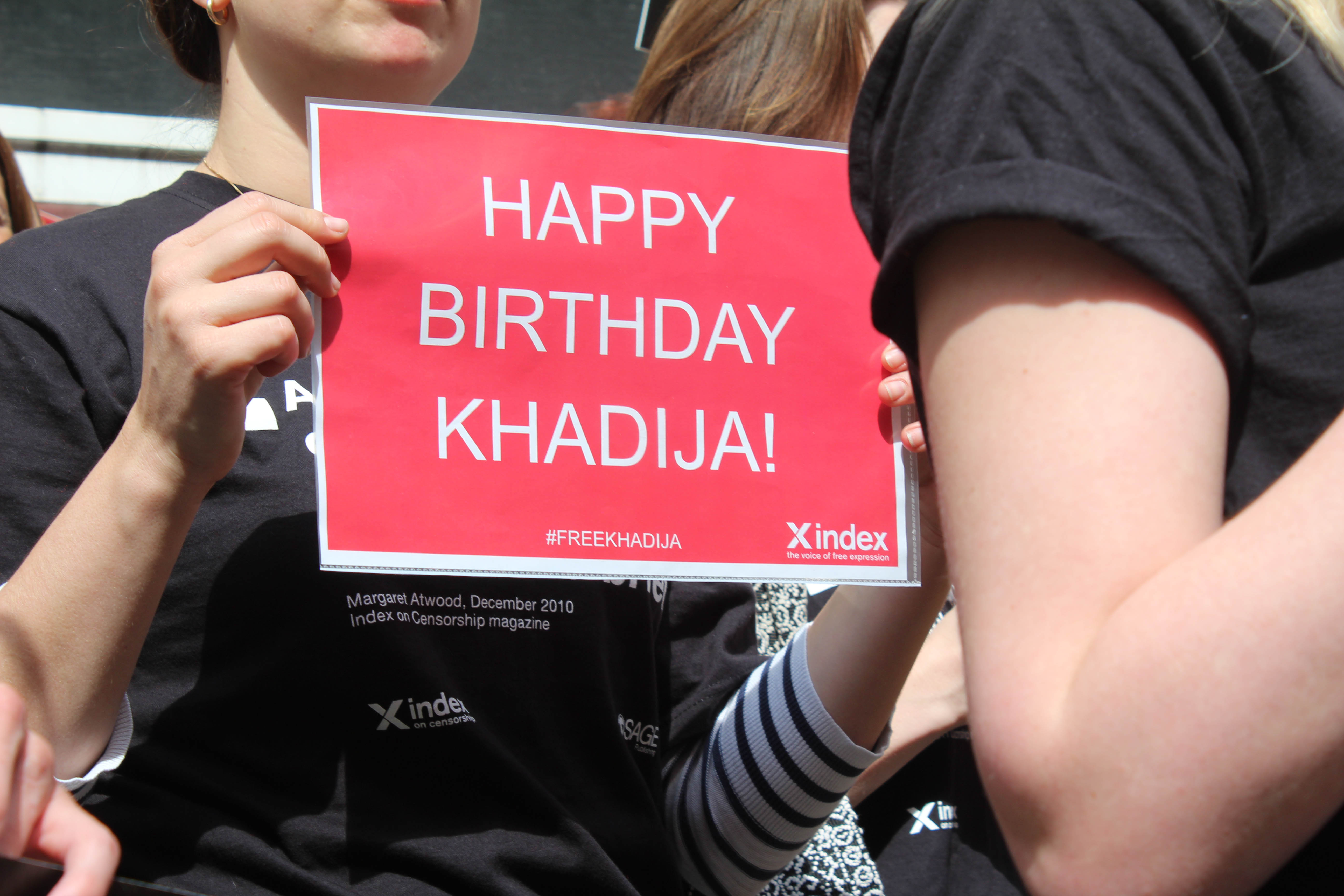
Protest for Khadija Ismayilova, Azerbaijan embassy, London. Credit: Cat Lucas, English Pen
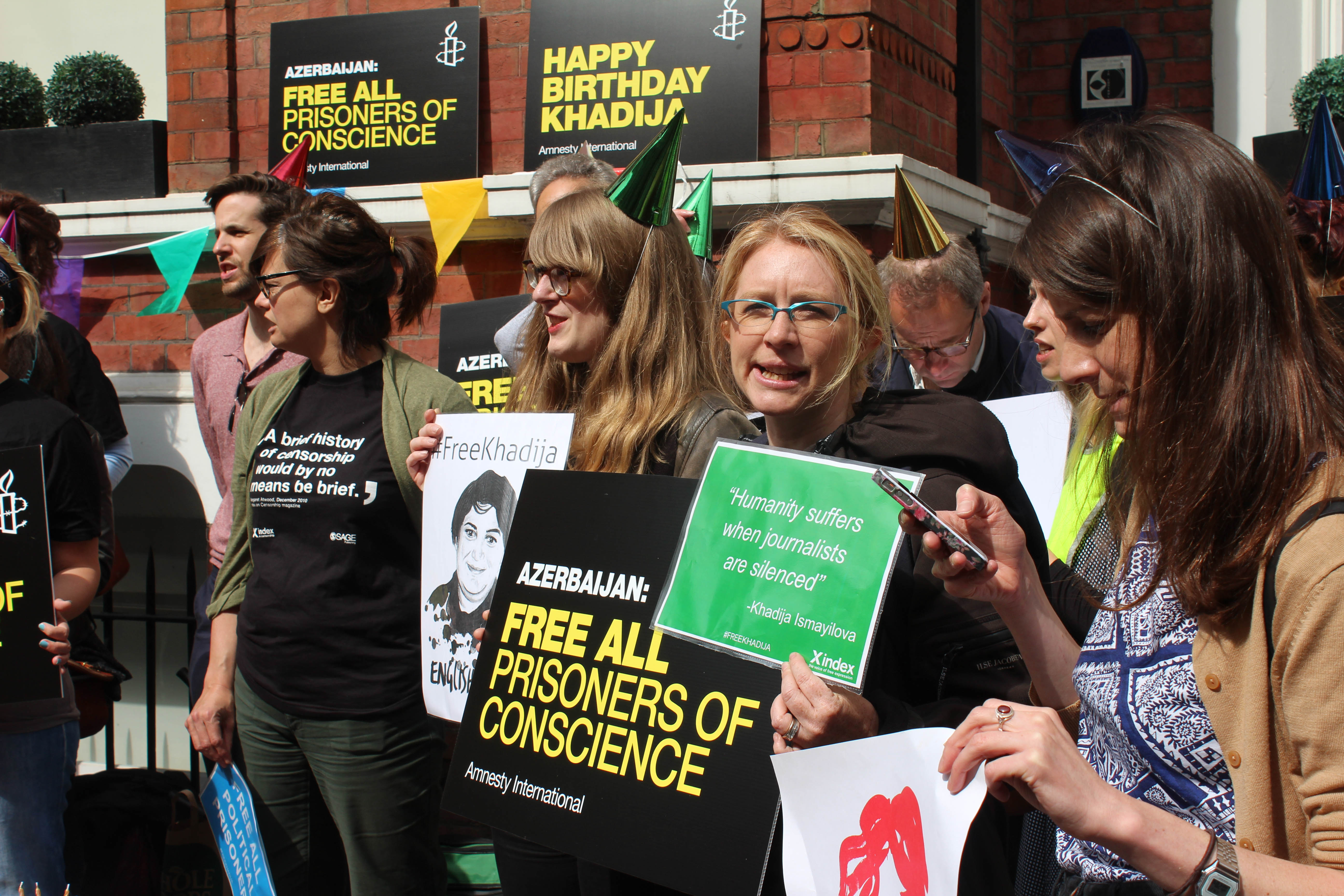
Protest for Khadija Ismayilova, Azerbaijan embassy, London. Credit: Cat Lucas, English Pen
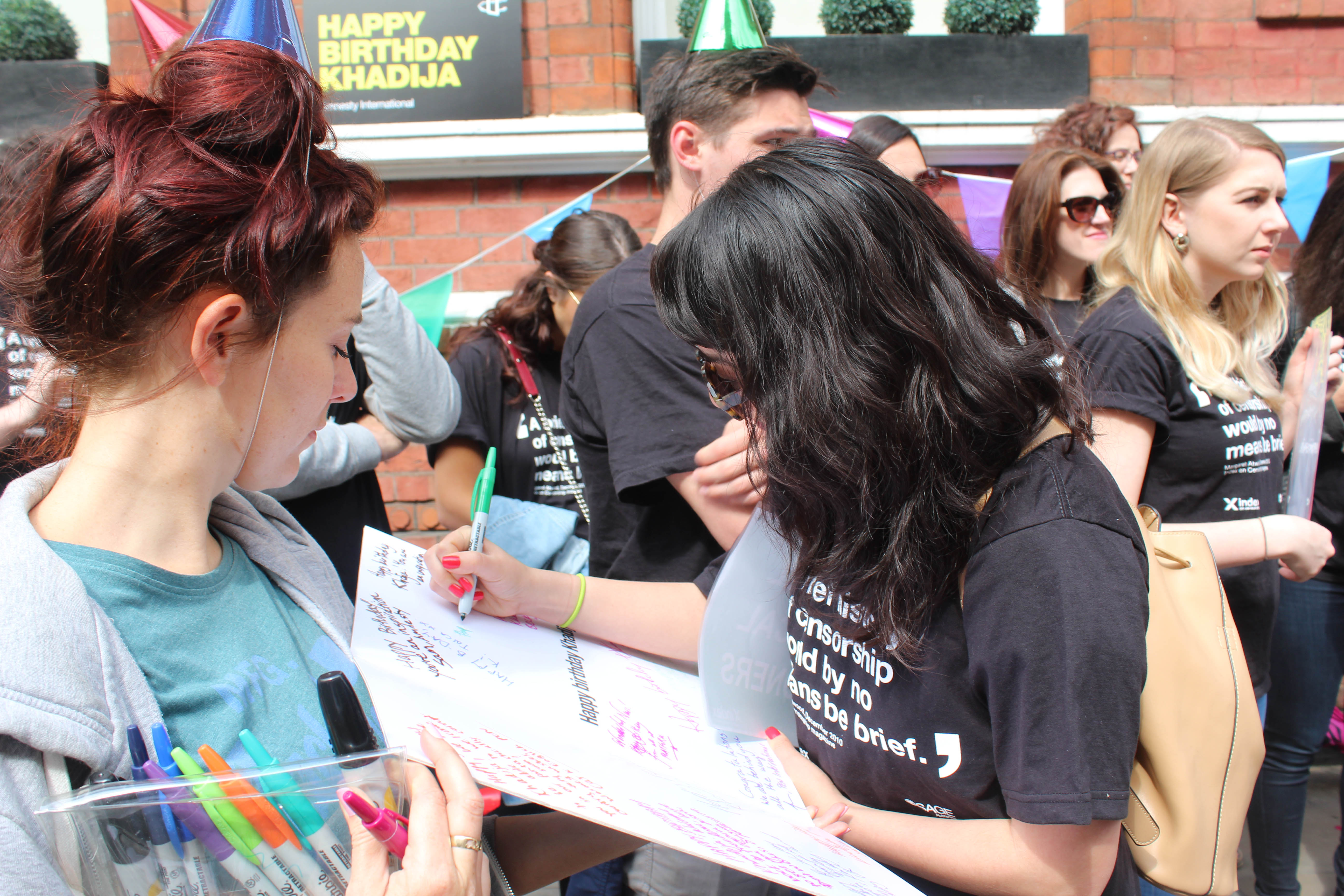
Protest for Khadija Ismayilova, Azerbaijan embassy, London. Credit: Cat Lucas, English Pen
Many more protests took place today. Here are some of them:
Paris, France
Washington DC, USA
Brussels, Belgium
Oslo, Norway
25 May 2016 | Azerbaijan, Azerbaijan News, Europe and Central Asia, mobile, News and features
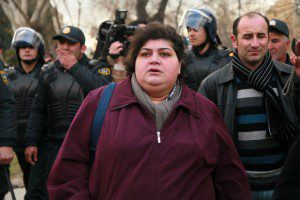 Azerbaijan’s Supreme Court has ordered the release of investigative journalist Khadija Ismayilova. But who is Ismayilova and why was she in prison?
Azerbaijan’s Supreme Court has ordered the release of investigative journalist Khadija Ismayilova. But who is Ismayilova and why was she in prison?
One of Azerbaijan’s most celebrated journalists, Ismayilova investigated, among other things, Azerbaijan’s human rights abuses and the corruption involving the family of president Ilham Aliyev. The recent Panama Papers have followed up on her work, exposing links between the president’s family and a network of offshore tax havens and hidden wealth.
Ismayilova was arbitrarily imprisoned in December 2014 and was sentenced in September 2015 to seven-and-a-half years in prison. Although she is officially charged with large-scale misappropriation and embezzlement, illegal entrepreneurship, tax evasion and abuse of official duties, it is widely believed that the real reason for Ismayilova’s imprisonment is her investigative journalism.
Before her arrest, Ismayilova had been subjected to a relentless campaign of intimidation and persecution, possibly orchestrated by the Azerbaijani authorities to discredit her investigative reporting on corruption amongst the highest levels of society.
“Khadija Ismayilova has suffered a serious invasion of her personal privacy through the installation of hidden cameras and wires in her flat and publication of secretly filmed videos among other incidents. Azerbaijan has a positive obligation to carry out an effective investigation into these violations,” said Camila Graham-Wood, legal officer at Privacy International.
Human rights lawyer Amal Clooney has been representing Ismayilova during her case at the European Court of Human Rights.
Her work was recognised by the United Nations which awarded her the prestigious Unesco/Guillermo Cano World Press Freedom Prize. When Ismayilova was in prison, her mother, Elmira Ismayilova, accepted the award on her daughter’s behalf. She read a statement Ismayilova wrote from prison: “As you gather here tonight, I ask you not to laud my work or my courage, but to dedicate yourself to the work each one of you can do on behalf of press freedom and justice.”
She read a statement Ismayilova wrote from prison: “As you gather here tonight, I ask you not to laud my work or my courage, but to dedicate yourself to the work each one of you can do on behalf of press freedom and justice.” Ljiljana Zurovac, president of the Unesco/Guillermo Cano World Press Freedom Prize 2016 jury, said: “Khadija Ismayilova highly deserves the prize and I am happy to see that her courage and professionalism are recognised.”
Azerbaijan is one of the lowest ranked countries for press freedom, being placed 163 out of 180 countries on the 2016 Reporters Without Border’s World Press Freedom Index.
Protests due to take place this Friday to mark Ismayilova spending her 40th birthday in prison will still go ahead to celebrate her release, call for her full acquittal and for the release of the country’s political prisoners, including Ilgar Mammadov, Seymur Hezi and Ilkin Rustemzade.
18 Jul 2012 | Azerbaijan News, Europe and Central Asia, News and features
 As the Eurovision Song Contest fades from memory, Azerbaijan has stepped up its attacks on journalists. Blogger Emil Baghirov reports on the dire state of press freedom in the Caucasus nation
As the Eurovision Song Contest fades from memory, Azerbaijan has stepped up its attacks on journalists. Blogger Emil Baghirov reports on the dire state of press freedom in the Caucasus nation
(more…)






 Azerbaijan’s Supreme Court has
Azerbaijan’s Supreme Court has 